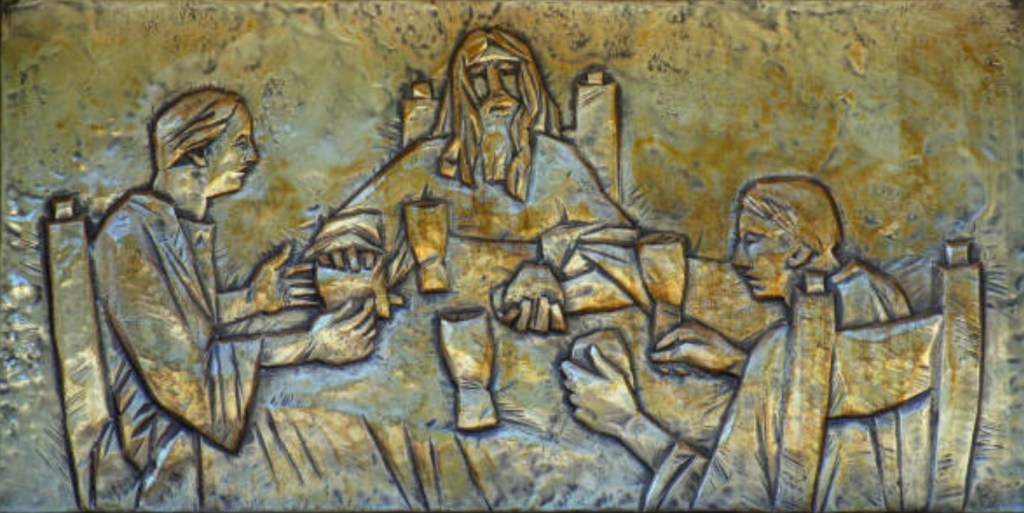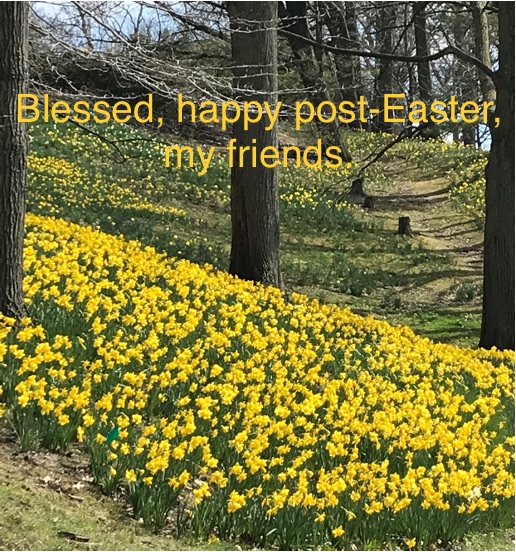
Have you ever walked with someone who was grieving or deeply depressed? Your companion usually does not look at you, at least continuously, her head is bowed as she listens and speaks. You stop occasionally to make a point or touch her arm to warn of an impediment on the road. You are aware that your friend is in another universe, enveloped in a sorrow you find impossible to reach. But still you travel on. Grief assumes its own gravity dropping to the feet and making the walk a leaden heaviness of despair.
During this Lent, we have meditated on the Jesus of Accompaniment, the One who walks with us at all times though we often do not realize it. The walk to Emmaus is a beautiful story of Jesus accompanying two grief-stricken disciples who are pondering the events of Good Friday. Jesus joins them as a stranger on the road while they walk to Emmaus, about seven miles from Jerusalem. The Jesus of Accompaniment possesses a glorified body; he has already risen from the dead into the fullness of life. He is unrecognizable.
Like so many others, the two disciples traveling to Emmaus believed Jesus would liberate them from political oppression, and now, to their great horror, Jesus’s body is missing. Their world is mysterious and they are confused in their grief.
The evangelist Luke is writing for gentiles in his Gospel where this story is told. Some scholars say that Luke moves the teaching on the Eucharist from the Last Supper in its Jewish context of the Passover, to the celebration of Eucharist in a non-Jewish setting at Emmaus, a distance from Jerusalem the seat of the Jewish faith. Further, the meal at Emmaus in not contextualized in a Jewish ritual. Luke is so sensitive to all nationalities and faiths that he establishes that Jesus accompanies everyone through Eucharist, no matter where or with whom. Luke narrates that the two disciples invite Jesus to stay the night after supper with them on the road. When the supper turns into a celebration of the Eucharist, they suddenly recognize Jesus and exclaim that their “hearts were on fire” as he spoke to them. They immediately turn back to Jerusalem to rejoin the apostles. Their Jewish roots are strengthened and their outreach to evangelization assured.
Reflection
Reflecting on the meaning of Emmaus, Susan Durber has written, “…the accompaniment of Jesus in our own lives can hold us through times of grief.” Not only in our soul’s imagination and belief does he hold us but in the reality of broken bread and wine which say to us: “I’ve been there. I know what you are suffering. I am with you.” The first lesson of Emmaus that we must remember is that Jesus really does travel with us in our sorrows and losses and if we are followers of this Jesus, we, too, are commissioned to accompany those suffering loss and enduring grief. There is hope and we travel together to find it under the rubble of life.
The second lesson of Emmaus is what the immense gift of the Eucharist means for this new faith. This story, distanced by surroundings and experienced by followers, not apostles, demonstrates the universality of Eucharist. It reinforces the humility of God being part of us, among us, and most important – in us. Taking in the Eucharist is an act of willingness on our part to become more of Christ and an act of humility on Christ’s part to become one within us. The results of this communion is that Christ takes fuller stature in us and we become more like him and we run with the mission to tell others, to lead others. Many years ago I read Walter Ciszek’s book, With God in Russia, in which Ciszek, a Jesuit priest and prisoner of war in Siberia for 23 years during World War II, recounted his life in the camps and his secret ministry among the prisoners. I remember a moving section of the book in which he described saving morsels of bread to consecrate, and how he would send signals that the consecration was happening and then deftly distribute morsels as communion. That was Emmaus. Fearful believers. Compassionate minister. Brokenness in broken bread. Hope at the handle of the shovel trying to break through the frozen earth of war and hatred.
And that is why we partake of Eucharist. It expands our love and belief and hope. It invites Jesus Christ to come in, to challenge us, to love us, to encourage us to go on, to fill us with all we need to bring him to others so they may enjoy the same gift we have. We do this in community because we need each other to have the complete Emmaus experience. We then go forward into our mission.
During these immediate post-Easter days, read and reflect on Luke 24:13-35, the story of Jesus at Emmaus. Read it carefully and slowly.
Do you see any connection to your own life in this story? For instance, do you believe that Jesus is with you when you, or a friend, is suffering any kind of loss? More important what do you think keeps you from recognizing that Jesus is with you or your friend experiencing a loss?
Do you believe that reception of the Eucharist impels you to connect and share with others or do you feel satisfied that it is only a private communion between you and Jesus?
Can you recall any time when Eucharist-the Risen Lord in our bread of life-inspired you to follow him better and serve others more generously?
I get joyful seeing the daffodils and the buds on trees.
I hope you do as well!

perfect picture (daffodil hill) to go with your reflection – they are in full bloom now – treat your self to a get away and see them!
LikeLike
Dear Sr. Mary Ann,
I do appreciate reading your marvelous reflections each Monday! Your spirituality and insight always give me time to pause and reflect. Thank you so much!
LikeLike
Dear Sr. Mary Ann,
I do appreciate reading your marvelous reflections each Monday! Your spirituality and insight always give me time to pause and reflect. Thank you so much!
LikeLike
Thank you, Rita. I turn on the computer and the Spirit writes!! Isn’t that magnificent?
May God be with you in your pursuit of our beautiful faith. S. MAF
LikeLike
Thelma: We he daffodils in our yard that I anticipate every year. They are a gift when they appear and I am totally in awe. I end up picking them before they die for our altar or table. Their beauty is tenuous but so overwhelming when they appear! S. MAF
LikeLike
Thank you! This is so appropriate today, I can’t thank you enough for sharing your thoughts with us! Take care, Margaret
LikeLike